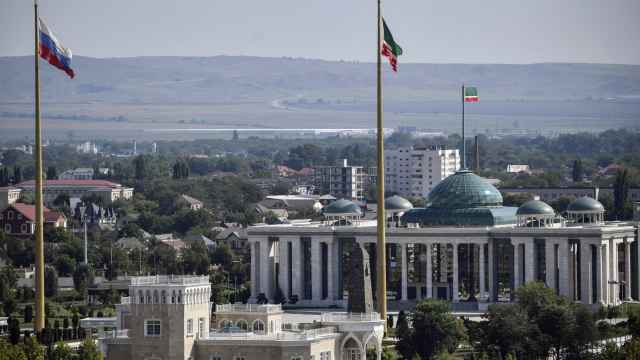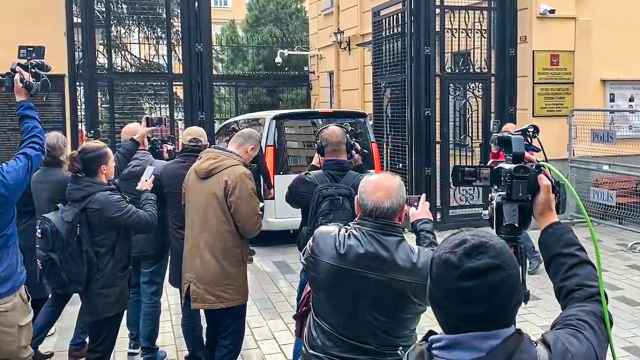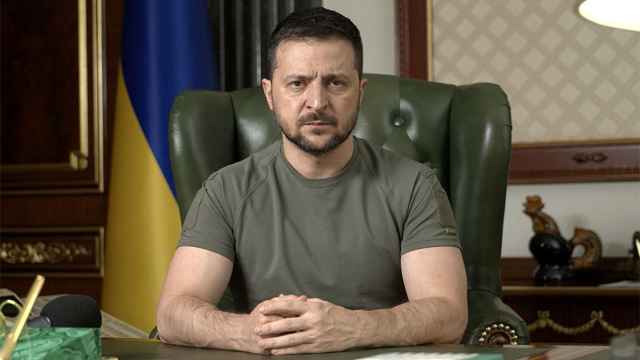Russia is headed for some major shocks. I came to that conclusion after reading a news release with the heading: “Yabloko Party Activists Detained at Putin’s Black Sea Dacha.” The key word here is “dacha.”
Late last year, businessman Sergei Kolesnikov wrote an open letter informing President Dmitry Medvedev that Prime Minister Vladimir Putin was having a $1 billion palatial residence built for himself on the Black Sea shore, and the money to finance the project was obtained by extorting money from businesses. Kommersant, Dengi, Vedomosti and Novaya Gazeta newspapers and Radio Svoboda all ran stories on the subject, and Sobesednik newspaper reporter Rimma Akhmirova was recently arrested at the construction site. Investigations by journalists have generally corroborated Kolesnikov’s claims.
Instead of being elated by the triumph of the free media over corruption, I am deeply concerned. The problem is that every time there is a public fight against “dacha corruption,” it ends with a new round of hardships for ordinary citizens.
For example, in 1990-91, rather modest dachas owned by nine ministries from the Soviet Union’s powerful military industrial complex were bought out by top officials from those ministries. Then, in summer 1991, democrats from the Supreme Soviet attacked this blatant attempt at nomenklatura privatization. A coup d’etat was all but unavoidable. The captains of military industry had no qualms about shedding their Communist ideology; it was their dachas they were prepared to defend tooth and nail. A nomenklatura putsch was staged in August 1991, and that soon led to the collapse of the Soviet Union.
Soviet leader Mikhail Gorbachev lost power when he was at his dacha in Foros, Crimea, the construction of which had met with significant opposition even during the perestroika years. He was first kept in isolation there by the people who had staged the putsch and later brought to Moscow by the victorious democrats to be subjected to public humiliation.
In 1992-93, the ideological struggle between the “democratic” President Boris Yeltsin and the “red-brown” Supreme Soviet boiled down to the media outlets controlled by both forces reporting on how the other side was building luxurious suburban dachas for themselves while the people were going hungry. The end result was the order for tanks to fire on the White House and the passage of the authoritarian 1993 Constitution.
The next round of the dacha wars was fought in the international arena. During the 1999 State Duma election campaign, reporters from the pro-Luzhkov NTV showed aerial shots of an enormous castle in southern France that they claimed belonged to the Yeltsin family. The pro-Yeltsin ORT television station aired live reports from a collection of luxurious cottages in Spain and claimed that they belonged to the owners, senior managers and leading journalists of NTV. Since then, there hasn’t been any free, balanced coverage of elections.
The next dacha war was initiated in the fall. Reports on Luzhkov’s opulent dachas outside Moscow and in Austria was a key weapon used by state-
controlled media to discredit the capital city’s mayor, who had fallen out of favor with the president.
And now we have the latest dacha scandal, and this time it involves Putin. For the time being, all talk about Putin’s palace has been confined to the print media, but when we start seeing aerial shots of the castle on our television screens, you can be sure that another wave of political upheavals will soon follow.
Alexei Pankin is editor of WAN-IFRA-GIPP Magazine for publishing business professionals.
A Message from The Moscow Times:
Dear readers,
We are facing unprecedented challenges. Russia's Prosecutor General's Office has designated The Moscow Times as an "undesirable" organization, criminalizing our work and putting our staff at risk of prosecution. This follows our earlier unjust labeling as a "foreign agent."
These actions are direct attempts to silence independent journalism in Russia. The authorities claim our work "discredits the decisions of the Russian leadership." We see things differently: we strive to provide accurate, unbiased reporting on Russia.
We, the journalists of The Moscow Times, refuse to be silenced. But to continue our work, we need your help.
Your support, no matter how small, makes a world of difference. If you can, please support us monthly starting from just $2. It's quick to set up, and every contribution makes a significant impact.
By supporting The Moscow Times, you're defending open, independent journalism in the face of repression. Thank you for standing with us.
Remind me later.





